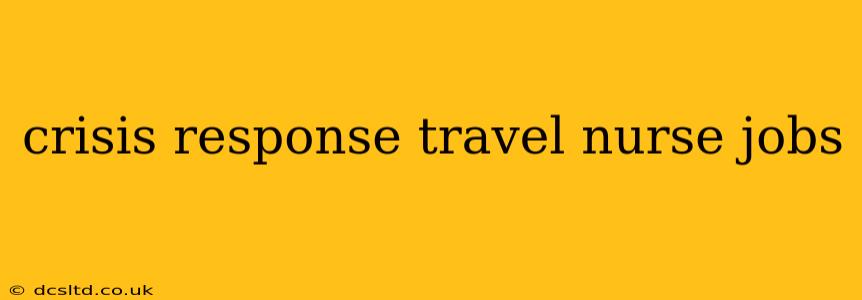The world of travel nursing offers incredible opportunities for adventure, professional growth, and making a tangible difference. But within that world lies a specialized niche demanding resilience, compassion, and exceptional skills: crisis response travel nursing. These nurses are the frontline responders during natural disasters, public health emergencies, and other critical events, providing vital healthcare services in challenging and often unpredictable environments. This guide explores this demanding yet rewarding career path, answering frequently asked questions and providing insights into what it takes to succeed.
What is Crisis Response Travel Nursing?
Crisis response travel nursing involves providing healthcare services in areas affected by emergencies or disasters. This could range from hurricanes and earthquakes to pandemics and humanitarian crises. These nurses are deployed to temporary facilities, often under challenging conditions, to address immediate healthcare needs. Their roles can vary widely, including direct patient care, triage, disaster preparedness, and public health initiatives.
What are the Responsibilities of a Crisis Response Travel Nurse?
The responsibilities of a crisis response travel nurse are diverse and often demanding. They may include:
- Direct Patient Care: Providing immediate medical attention, administering medications, monitoring vital signs, and performing wound care in makeshift medical facilities.
- Triage: Assessing patients' conditions and prioritizing treatment based on the severity of their injuries or illnesses.
- Disaster Preparedness: Assisting in setting up and managing temporary medical facilities, ensuring adequate supplies, and coordinating with other healthcare professionals.
- Public Health Initiatives: Participating in vaccination campaigns, health education programs, and other initiatives aimed at preventing disease outbreaks.
- Mental Health Support: Providing psychological first aid and support to victims and first responders experiencing trauma.
What Qualifications Do I Need to Become a Crisis Response Travel Nurse?
Becoming a crisis response travel nurse typically requires:
- Registered Nurse (RN) License: A valid and unrestricted RN license in at least one state, with the ability to obtain licenses in other states quickly.
- Experience: Several years of experience as a registered nurse, ideally in critical care, emergency room, or similar high-pressure environments.
- Certifications: Certifications like Advanced Cardiac Life Support (ACLS), Basic Life Support (BLS), and Pediatric Advanced Life Support (PALS) are highly beneficial and often required.
- Disaster Response Training: Specialized training in disaster response, emergency management, or crisis intervention is a significant asset. Some agencies may offer this training.
- Resilience and Adaptability: The ability to work effectively under pressure, in unpredictable situations, and with limited resources is crucial.
What are the Job Prospects for Crisis Response Travel Nurses?
The demand for crisis response travel nurses is consistently high, especially given the increasing frequency and severity of natural disasters and public health emergencies. While job security is never guaranteed, the specialized skills and experience of these nurses make them highly sought after by government agencies, non-profit organizations, and private healthcare companies.
What are the Benefits of Being a Crisis Response Travel Nurse?
Beyond the inherent job satisfaction of helping people in need, crisis response travel nursing offers:
- High Earning Potential: Crisis response assignments often command higher pay rates compared to traditional travel nursing positions due to the demanding nature of the work and the often remote locations.
- Professional Growth: This type of nursing provides invaluable experience and skill development in high-stakes situations, enhancing a nurse's career trajectory.
- Personal Fulfillment: The opportunity to make a profound difference in the lives of those affected by crises can be deeply rewarding.
What are the Challenges of Being a Crisis Response Travel Nurse?
The challenges associated with crisis response travel nursing are significant:
- High-Stress Environment: Nurses face intense pressure, long hours, and exposure to traumatic situations.
- Unpredictable Work Conditions: Assignments can be in remote locations with limited resources and infrastructure.
- Emotional Toll: Witnessing suffering and human tragedy can take a heavy emotional toll.
- Safety Concerns: The risk of personal injury or exposure to hazardous materials is a serious consideration.
How Can I Find Crisis Response Travel Nurse Jobs?
Many travel nursing agencies specialize in crisis response placements. You'll need to actively search for agencies that focus on disaster relief and emergency response. Networking with other travel nurses and attending industry events can also be beneficial. Look for agencies that provide comprehensive training and support.
Crisis response travel nursing is not for everyone. It demands significant skill, resilience, and emotional strength. However, for the right individual, it offers a uniquely fulfilling career path with opportunities to make a lasting impact on the lives of others while simultaneously accelerating personal and professional growth.
